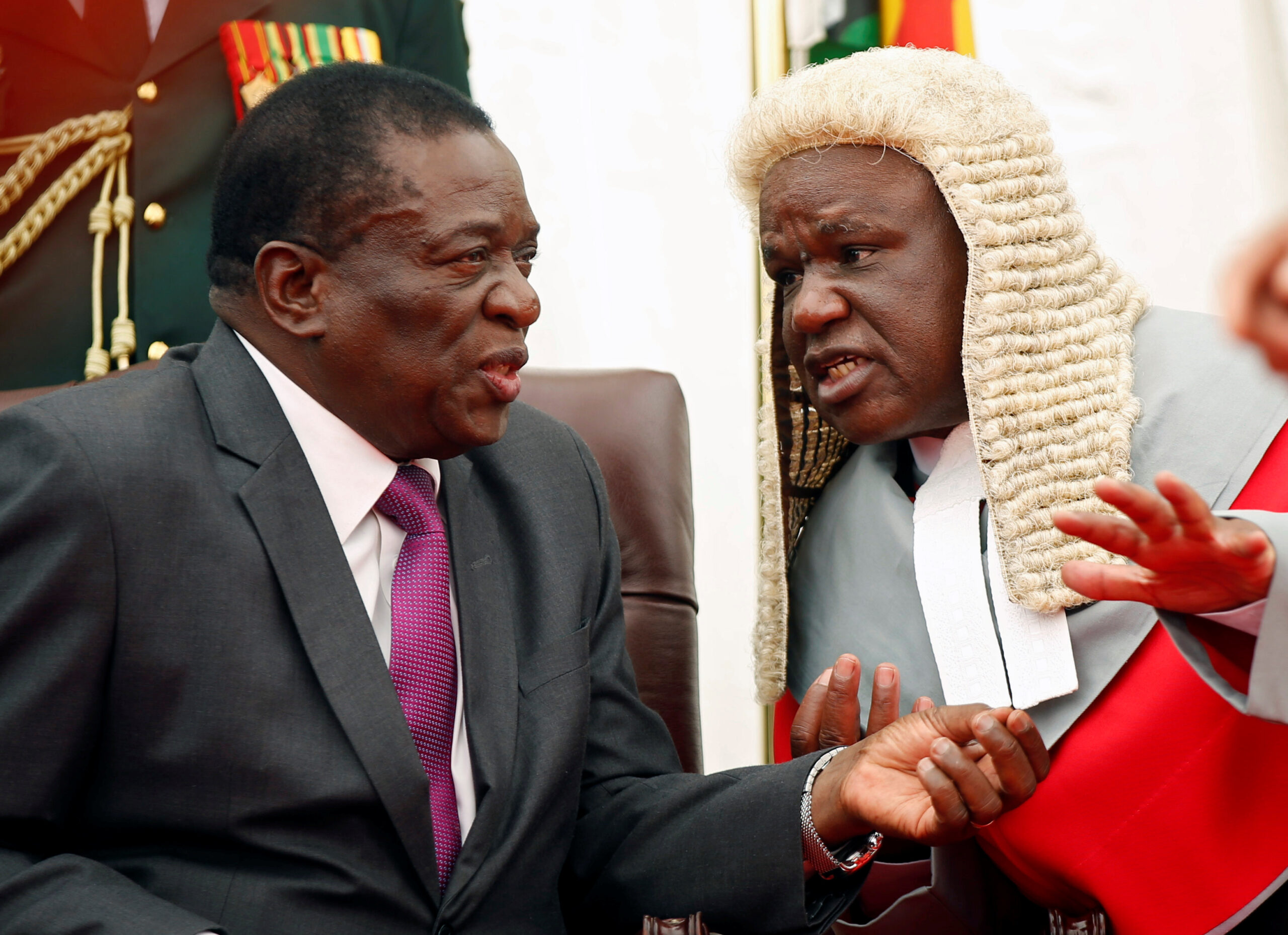CHIEF Justice Luke Malaba has endorsed the shambolic 23 August 2023 elections after he congratulated President Emmerson Mnangagwa on his victory and in the same light defended judges who handed down questionable judgments during electoral court challenges.
RUVIMBO MUCHENJE
Malaba made the remarks during the official opening of the legal calendar on 8 January 2024 under the theme The Role of the Judiciary in Entrenching Constitutionalism.
“During the year under review, and in compliance with the requirements of the Constitution, Zimbabwe held harmonised elections to elect the President, representatives of the people in Parliament and in local authorities. The Judiciary takes this opportunity to join the nation in commending Zimbabweans for exercising their constitutional right to deliver peaceful, free, fair and credible elections. On behalf of the Judicial Service Commission and the Judiciary, I take this opportunity to congratulate His Excellency Dr E.D. Mnangagwa for his re-election as the President of Zimbabwe. I also congratulate the two Honourable Vice-Presidents for their appointment to the key constitutional offices.”
His remarks come against the backdrop of the broad condemnation of the elections by accredited observer missions.
For the first time in the history of Zimbabwe’s contentious elections, the Southern African Development Community (Sadc) reported that the August polls did not fulfil the requirements of Zimbabwe’s constitution, the Electoral Act and the Sadc Principles and Guidelines on Democratic Elections.
An opposition candidate, former Zanu PF commisar Saviour Kasukuwere, whose case was dismissed on a technicality, cried foul, citing that judges were running away from listening to the merits of the cases, hence depriving him the right to participate in the elections.
Malaba says the reports of judicial capture were not only false but they also put a dent on the image of the Judicial Service Commission such that they had to engage the Law Society on the conduct of some lawyers.
“During the course of the elections period, disparaging and damaging remarks were made against the Judiciary in general and some Judges of the Supreme Court and the High Court. The unwarranted aspersions stemmed from decisions which the courts had made. Even more concerning was the fact that the disparaging remarks were made by some members of the legal profession who are expected to have known better. The JSC engaged the Law Society. The engagement resulted in the matters being resolved amicably,” said Malaba.
He lept to the defence of his tainted subordinates, saying the allegations of corruption are unfounded.
Ahead of the Kasukuwere case, reports of High Court judge David Mangota having received a house surfaced.
“There have been instances where litigants who lost cases went on a tirade, casting aspersions on the integrity of the courts and the Judges. They raised unfounded allegations of corruption, threatened, and attempted to intimidate judicial officers who would have made decisions against them. At the last count, seven Judges had fallen victim to the vile misinformation and attempted intimidation,” said Malaba.
He added that opposition activists were abusing the judiciary’s processes of appeal to taint the image of the courts.
“Constitutionalism discourages vexatious and unrelenting litigation by litigants whose conduct is directed at undermining public confidence in the independence and integrity of not only the Judiciary but the entire administration of the justice system. The respect for the rule of law and for the independence of the courts demanded by constitutionalism requires that litigants should comply with court orders and legitimately use the remedies put in place by the law to challenge the unfavourable decisions of the courts,” Malaba said.
“Appeal processes and complaints mechanisms are not intended to be abused by litigants for selfish ends. The designation of appeal courts by the Constitution arose out of a recognition of the fallibility of, and the possibility of error on the part of, judicial officers and the need to put in place effective remedies for correcting such errors. Section 164(3) of the Constitution provides that ‘an order or decision of a court binds the State and all persons and governmental institutions and agencies to which it applies, and must be obeyed by them’,” he added.
Malaba said the net effect of the court proceedings might be that judicial officers may shy away from making decisions fearing public backlash. He urged them to not be deterred.
“Judges should not shy away from making decisions on account of baseless complaints and allegations raised against them by vexatious litigants. Justice is not lopsided. It cannot be the norm that justice can only be said to have been done when the disposition is inclined to a particular outcome favoured by a litigant in question. It will be an affront to the doctrine of constitutionalism and the essence of the rule of law if Judges were to allow themselves to be intimidated by errant litigants who lose cases in court. In pursuing the entrenchment of constitutionalism, the Judiciary thus notes that vexatious litigation, unrestrained denigration, threats and spurious complaints against judicial officers have no place in a country controlled by a constitutional order. The Judiciary will continue to dispense justice in terms of the law, impartially, without fear, favour or prejudice,” said Malaba.

